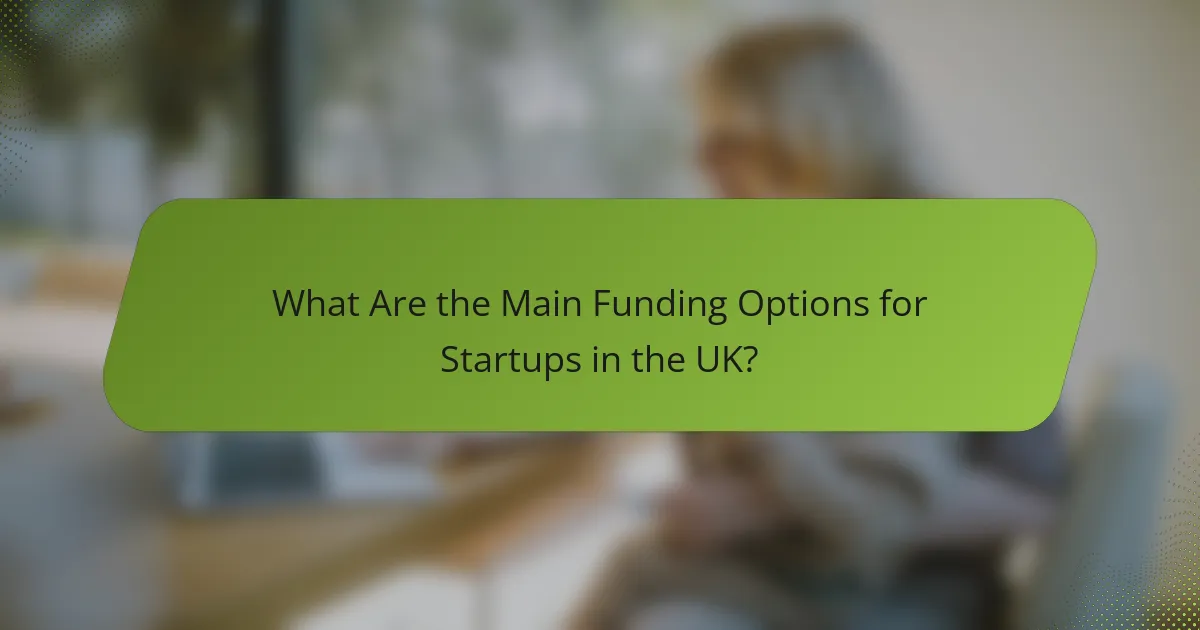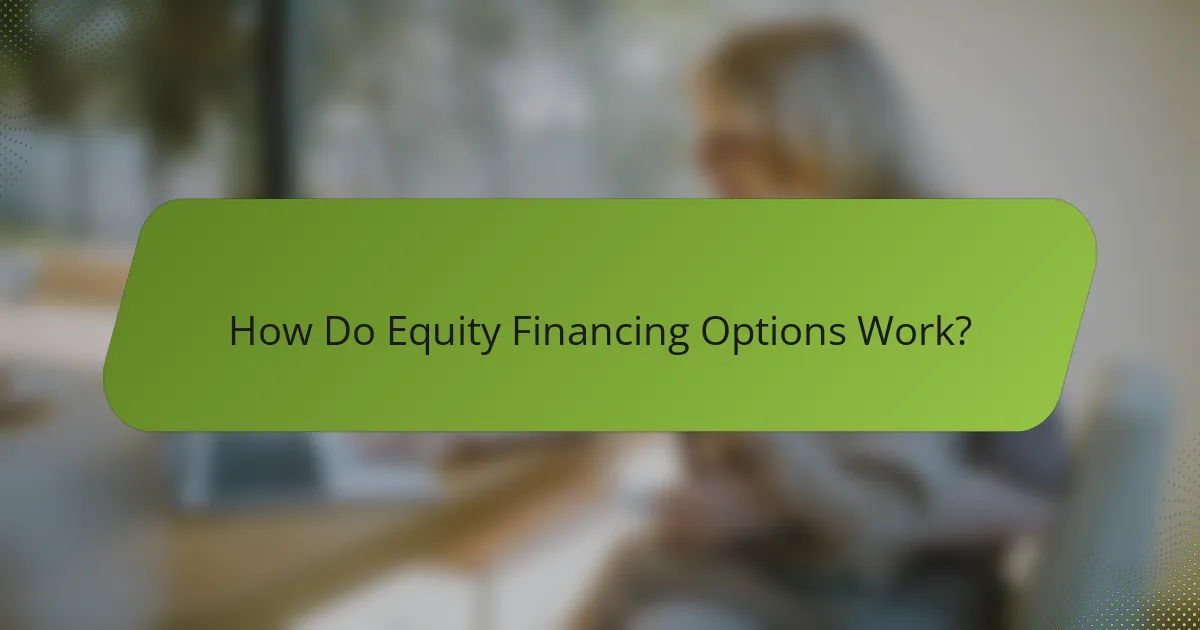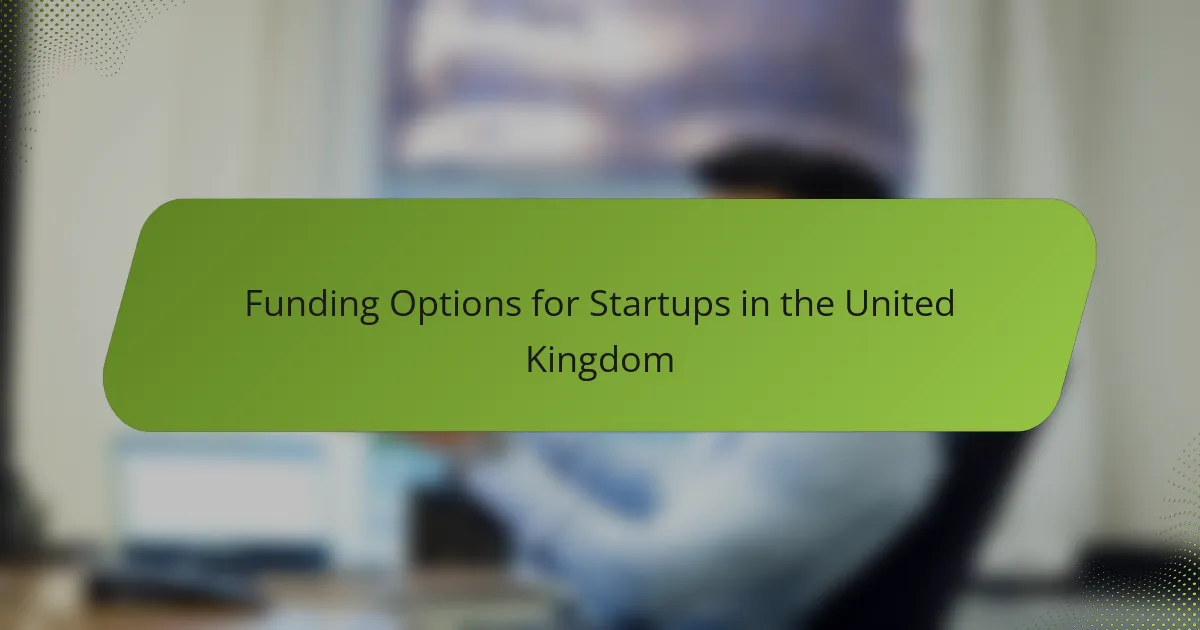Startups in the UK have a variety of funding options to explore, each offering unique benefits and challenges. Entrepreneurs can choose from equity financing, debt financing, grants, crowdfunding, and support from angel investors to secure the necessary capital for growth and development.

What Are the Main Funding Options for Startups in the UK?
Startups in the UK have several funding options available, each with its own advantages and considerations. The main avenues include equity financing, debt financing, grants and competitions, crowdfunding, and angel investors.
Equity Financing
Equity financing involves raising capital by selling shares of the company to investors. This method allows startups to gain funds without incurring debt, but it dilutes ownership and control. Investors typically expect a return on their investment through dividends or capital gains.
Common sources of equity financing include venture capital firms, private equity investors, and crowdfunding platforms that focus on equity. Startups should prepare a solid business plan and financial projections to attract potential investors.
Debt Financing
Debt financing means borrowing money that must be repaid over time, usually with interest. This option allows startups to retain full ownership but requires a reliable cash flow to manage repayments. Common forms include bank loans, credit lines, and government-backed loans.
Startups should consider their ability to repay the debt before pursuing this option. It’s advisable to compare interest rates and terms from various lenders to find the most favourable conditions.
Grants and Competitions
Grants and competitions provide non-repayable funds to startups, often aimed at specific sectors or innovations. These funds can be sourced from government programmes, private foundations, or industry competitions. Winning a grant can also enhance credibility and visibility.
Startups should research available grants and competitions relevant to their industry and ensure they meet eligibility criteria. Applications often require detailed project proposals and budgets, so preparation is key.
Crowdfunding
Crowdfunding allows startups to raise small amounts of money from a large number of people, typically via online platforms. This method can validate a business idea and build a customer base early on. However, it requires effective marketing to attract backers.
There are various types of crowdfunding, including reward-based, equity-based, and donation-based. Startups should choose the model that aligns with their goals and prepare engaging content to promote their campaign.
Angel Investors
Angel investors are wealthy individuals who provide capital to startups in exchange for equity or convertible debt. They often bring valuable expertise and networks, which can benefit the startup beyond just financial support. However, they may seek significant ownership stakes.
To attract angel investors, startups should have a clear business plan and demonstrate potential for growth. Networking and attending startup events can help connect with potential angels who are interested in specific industries.

How Do Equity Financing Options Work?
Equity financing options involve raising capital by selling shares of your startup to investors. This method allows businesses to obtain funds without incurring debt, but it often means giving up a portion of ownership and control.
Venture Capital
Venture capital (VC) is a form of private equity financing where investors provide funds to startups with high growth potential in exchange for equity. Typically, VC firms invest in businesses that are beyond the seed stage and have a proven concept, often requiring significant market traction.
When seeking venture capital, startups should prepare a solid business plan and demonstrate scalability. VC investments can range from hundreds of thousands to millions of pounds, depending on the startup’s stage and potential. However, securing VC funding often involves rigorous due diligence and negotiation on terms.
Seed Funding
Seed funding is the initial capital raised to start a business, often sourced from personal savings, friends, family, or angel investors. This type of financing is crucial for covering early expenses such as product development and market research.
Seed funding amounts can vary widely, typically ranging from a few thousand to several hundred thousand pounds. Entrepreneurs should clearly articulate their vision and business model to attract seed investors. It’s important to understand that seed funding may come with less stringent requirements than venture capital, but it still requires a compelling pitch and a clear path to growth.

What Are the Benefits of Debt Financing?
Debt financing allows startups to secure capital while maintaining control over their business. By borrowing funds, entrepreneurs can access necessary resources without giving away equity, making it an attractive option for many UK startups.
Retain Ownership
One of the primary advantages of debt financing is that it enables founders to retain full ownership of their business. Unlike equity financing, where investors receive shares in exchange for their investment, debt financing requires repayment but does not dilute ownership stakes.
This retention of ownership is crucial for entrepreneurs who wish to maintain decision-making power and control over their company’s direction. For instance, if a startup borrows £100,000, the founders still own 100% of the business, unlike if they raised the same amount through equity financing, which could involve giving away a significant portion of the company.
Tax Deductions
Debt financing can provide tax benefits that enhance a startup’s financial position. In the UK, interest payments on loans are typically tax-deductible, which can reduce the overall tax burden for the business. This means that the effective cost of borrowing can be lower than it appears at first glance.
For example, if a startup pays £10,000 in interest on a loan, it may reduce its taxable income by that amount, potentially saving thousands in taxes depending on the applicable tax rate. However, it’s essential for startups to keep accurate records and consult with a tax professional to ensure compliance with regulations and maximise these benefits.

What Grants Are Available for UK Startups?
UK startups have access to various grants designed to support innovation and growth. These funding options can help cover costs for research, development, and operational expenses, making them essential for new businesses.
Innovate UK Grants
Innovate UK offers grants to support innovative projects across various sectors. These grants typically range from a few thousand to several million pounds, depending on the project’s scale and potential impact.
To apply, startups must submit a detailed proposal outlining their project objectives, expected outcomes, and how the funding will be utilised. Successful applications often demonstrate a clear innovation strategy and potential for market growth.
Common pitfalls include failing to align the project with Innovate UK’s priorities or submitting incomplete applications. Startups should ensure their proposals are thorough and address all evaluation criteria.
Regional Growth Fund
The Regional Growth Fund (RGF) aims to stimulate economic growth by providing grants to businesses in specific regions of the UK. This fund is particularly beneficial for startups looking to create jobs and boost local economies.
Grants from the RGF can vary significantly, often ranging from tens of thousands to millions of pounds. Startups must demonstrate how their project will contribute to regional development and job creation to qualify.
When applying, businesses should focus on clear, measurable outcomes and ensure compliance with local regulations. It’s crucial to engage with local authorities and stakeholders to strengthen the application and showcase community support.

How Does Crowdfunding Work in the UK?
Crowdfunding in the UK allows startups to raise funds from a large number of people, typically via online platforms. This method can provide access to capital without the need for traditional bank loans or venture capital, making it an appealing option for many entrepreneurs.
Equity Crowdfunding Platforms
Equity crowdfunding platforms enable startups to offer shares in their company to investors in exchange for capital. Investors receive equity stakes, meaning they can benefit from the company’s growth and profits. Popular platforms in the UK include Seedrs and Crowdcube, which have specific regulations to protect both investors and businesses.
When considering equity crowdfunding, startups should prepare a compelling pitch and a detailed business plan. It’s crucial to understand the potential dilution of ownership and the implications of having multiple shareholders. Generally, successful campaigns can raise anywhere from tens of thousands to several million pounds, depending on the business’s appeal and market potential.
Rewards-Based Crowdfunding
Rewards-based crowdfunding allows startups to raise funds by offering backers non-financial incentives, such as products or services, in return for their contributions. Platforms like Kickstarter and Indiegogo are popular for this type of funding, where backers typically receive rewards based on their pledge amounts.
This method is particularly effective for creative projects or product launches, as it helps gauge market interest before full-scale production. Startups should set realistic funding goals and clearly outline the rewards to attract backers. Campaigns can vary widely in funding targets, often ranging from a few hundred to several hundred thousand pounds, depending on the project scope.

What Are the Criteria for Securing Funding?
Securing funding for startups in the United Kingdom typically hinges on several key criteria, including a solid business plan, a clear value proposition, and a capable management team. Investors often look for evidence of market demand and financial projections that demonstrate potential for growth.
Business Plan Quality
A well-structured business plan is essential for attracting funding. It should outline your business model, target market, competitive analysis, and financial forecasts. Investors favour plans that are realistic and backed by thorough research, as this indicates a higher likelihood of success.
Market Demand
Demonstrating market demand is crucial. Startups should conduct market research to validate their product or service’s appeal. Providing data on customer interest, trends, and potential market size can significantly enhance your funding prospects.
Management Team Experience
The experience and skills of your management team can greatly influence funding decisions. Investors prefer teams with a track record in relevant industries, as this suggests they are equipped to navigate challenges. Highlighting key team members’ backgrounds and achievements can strengthen your case.
Financial Projections
Realistic financial projections are vital for securing funding. Startups should prepare detailed forecasts that include revenue, expenses, and cash flow for at least the next three to five years. Clear, achievable milestones can help reassure investors about your growth potential.
Regulatory Compliance
Understanding and adhering to regulatory requirements is essential for UK startups seeking funding. This includes registering your business, complying with tax obligations, and ensuring any necessary licences are in place. Being proactive about compliance can enhance credibility with potential investors.
